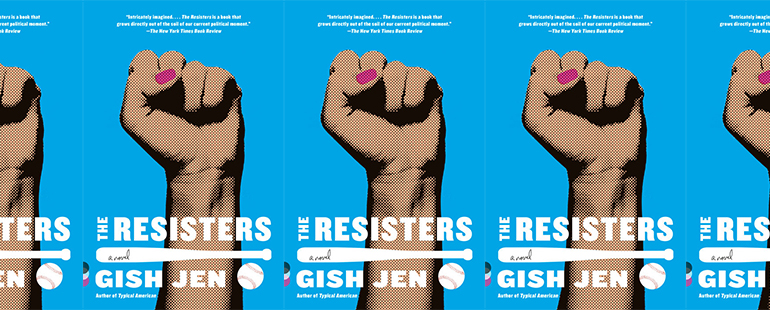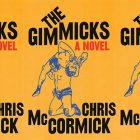“I see fiction as restoring to the world some of its actual complexity”: An Interview with Gish Jen

For more than thirty years now, Gish Jen has been writing fiction that explores the American landscape while ranging across any boundaries expectations about literary fiction might try to impose: her five novels and many short stories are literary and entertaining; funny and serious; rich in characters with stories to tell. Whether she’s writing from the point of view of a Chinese American teenager in a primarily Jewish suburb, as in Mona in the Promised Land (1996), or the sharply observant and comic Hattie Wong in World and Town (2010), Jen creates characters who explore not just what it is to be American, but what it is to be human.
As I was reading The Resisters (2020), her most recent novel, it felt, to me, like Jen’s most blatantly political work of fiction—and ostensibly it is. Set in a futuristic dystopia called “AutoAmerica,” its characters are beset by all the problems wrought by the failure of today’s governments to tackle the pressing issues of our time: climate change, inequality based on race and income, automation and resulting job losses, and the convenience of technology vs. privacy. Begun ten months after Trump took office, this dystopia, like most dystopias, is clearly a reflection of our contemporary world. It’s not only a novel about a community of resisters fighting the racist, classist, and environmentally unsound structures of their society—the book is itself a piece of resistance.
How much, I wondered, was it influenced by the nonfiction work she’d published since her previous novel? Tiger Writing: Art, Culture, and the Interdependent Self (2013) came out of her participation in the William E. Massey Lectures in American Studies series at Harvard, and explored how her writing was influenced by the different ways people from the “East” and “West” tell their own stories; The Girl in the Baggage Claim (2017) broadens out this investigation into how people balance independence or interdependence. Was Jen purposefully writing in a more political vein when she returned to fiction? It was this idea that prompted me to interview her (Jen and I have both been published in Ploughshares; Jen has also served as guest editor) about writing as resistance.
As soon as I took just a cursory glance through Jen’s back catalog, however, I had to question my initial reaction. Her first book, Typical American (1991), puts my idea immediately into doubt, as the title alone raises implicit questions about who’s typical, who’s American, and who decides. In the collection Who’s Irish? (1999)—a way of asking, Who’s anything?—she continues to prompt her readers to rethink their own ideas about race and class.
And isn’t Jen’s continued examination of generational differences also political? The first story I remember reading by Jen is “Who’s Irish?,” about a comically sharp-tongued grandmother from China – Jen’s fiction is filled with problematic mothers and grandmothers—who encapsulates her personality perfectly when she tells us: “I am work hard my whole life, and fierce besides.” Forced to babysit her wilful granddaughter, she begins spanking her when she misbehaves—until one day, she ends up going too far. The grandmother makes a poor mistake, but she’s not entirely wrong, either. The girl is spoiled; her daughter’s husband is lazy; her daughter should take better care of her mother and herself. Jen questions the assumptions of the current generation about their parents and grandparents, calls them on their self-satisfied sense that they’re doing things better. One of Jen’s gifts, I think, is to reveal, even to readers who think of themselves as politically astute and socially aware (guilty as charged), the assumptions they are not aware of making.
Jen has clearly been investigating societal issues from the very beginning. How had I forgotten that? In part, the wickedness of Jen’s humor belies the seriousness of her social commentary. A constant in her fiction, this humor is also sneakily subversive. (Jen told me, when I interviewed her in 2004, that she has to filter out her humor as she edits, “because the humor can be like a very, very bright light, that blanches out everything else.”) When Mama Wong from her novel The Love Wife (2004) labels her son’s non-Chinese wife “Blondie,” it’s funny—though maybe it shouldn’t be? And yet, the more I think about it, the funnier it is, although I remain sympathetic to Janie throughout the novel, as she begins to feel like a foreigner in her own family—though it is clearly Lanlan, a Chinese relative whom Mama Wong brings to the United States, who suffers horribly. The tragedy is hers (and ours, too).
I suspect that the accessibility of Jen’s fiction also camouflages the political undercurrents of her work. Her writing reminds me more of Dickens than Flaubert; more of George Eliot than Henry James; more of Zadie Smith than Rachel Cusk. She’s more interested in story than language for the sake of it—which isn’t to say that Jen’s language isn’t careful and precise and at times beautiful. Jen’s writing doesn’t consist so much of dazzlingly complex sentences that might draw the reader’s attention away from the story; instead, arrays of simpler sentences form an elegant, if subtly beautiful, passage, such as this one from The Resisters:
[W]hen I looked into Eleanor’s eyes these days I was not always sure what or whom I was seeing. Was that she, in those familiar black pupils? And what was it in her that made her Eleanor? What was it, without which she had to be said to have morphed into someone else? Was it a soul? What a hard word that was to corral up with other words, and yet when I looked into her eyes, I knew that that was what I yearned to glimpse Eleanor’s soul. Eleanor.
Was it a soul? That simple question needs every one of the sentences around it, yet it is the one I circle back to so I can read it again. It helps me to see, helps me breathe.
This points to another reason I may have overlooked the political nature of Jen’s writing: the complexity of her ideas and characters make her books impossible to label, and maybe we think of political fiction as using labels. Jen’s work isn’t ever political fiction in that way. The Resisters is a good example of why: at its heart is the story of a talented young girl, Gwen, who wants to become a baseball pitcher, and two parents who want to see her flourish. Her mother is a former lawyer and the principal resister in the book—she uses the Constitution to fight unjust practices by the government in AutoAmerica and has spent time in prison because of her work, and so this family is highly aware of the compromises Gwen might have to make to live her dreams.
Like all Jen’s work, The Resisters is many things: a baseball novel, a bildungsroman, a protest novel. It is dystopian yet hopeful. In its midst, though, is the story of a young woman who may—or may not; I won’t give away the ending—become not just a record-breaking baseball pitcher, but a resister.
Once more, Jen’s characters escape from the ideas underpinning her novels and into the readers’ gaze. Complicated, flawed, and likeable characters—human beings is what they feel like—are at the center. We root for all of them, not just Gwen on the pitching mound.
I spoke to Jen as The Resisters was coming out in paperback, just days before Trump would leave office. And now I realize that—of course!—it is the society in which we’re living—post-Trump, and not really post-Trump—that is bringing the political nature of Jen’s work to our attention. It’s not the work itself that has changed, but our understanding of it, and our understanding of our need for such work. We are desperate for understanding; we are desperate for illumination; we are desperate to be shown how—and even what—to resist.
Carole Burns: It does seem to me that your fiction has always had an element of resistance, that it contained within it political undertones, even if less directly than in The Resisters. Do you think that’s true?
Gish Jen: I don’t think of my writing as so much about politics as culture. However, it does often seek to change the culture in a way that might be seen as political. My very first book, Typical American, for example, sought to redefine what an American is. I’m sure that was in part because I myself am a person who is not always seen as American. That moved me to suggest that an American is not so much a person who grew up on a farm and eats apple pie, as a person preoccupied with identity. As soon as you start to ask yourself, What does it mean to be an Iranian American, a Bulgarian American, an Irish American?, I proposed, you are an American.
And then I wrote Mona in the Promised Land, about the invention of ethnicity. Today we take it for granted that people like me are “Asian American,” as if that is somehow natural. But of course, ethnic categories of that sort are actually a fairly recent invention. No sooner had Black people stood up in the aftermath of the civil rights movement and said, “I’m black and I’m proud,” than the Jews stood up and said, “I’m Jewish and I’m proud.” Which was a big deal for them, by the way, coming as many of them did from families that had done everything possible to erase their ethnic roots. Their parents were shocked that they were wanting to be bar and bat mitzvahed, and that was even before they realized the kids were planning to do this barefoot. As for people like me—who knew what the word was for people like me? People were still calling us “Orientals.”
I was interested in the moment in which people began to claim their ethnic identity, but also the way in which that was a manifestation of being American. So I suppose that was “political,” in the sense that Mona, like Typical American, sought to expand what it means to be American—that it suggested that claiming your ethnicity was not opposed to assimilation but actually a form of assimilation. That it was a form of being American.
CB: I can see how much The Love Wife plays with ideas of assimilation, in very complicated ways.
GJ: The Love Wife is a 9/11 book. It asked the question: post- 9/11, will America be pulling up the welcome mat? The answer to which has unfortunately proven, just as the book suggested, yes. But it is about other things as well, including what family is—whether a chosen family can be a “real” family. Does a “real” family have to be biological? And, yes, “family” can be read as a metaphor for “nation”—which, yes, is at some level political.
CB: Do you think when you were younger that you were less conscious that your writing was addressing societal concerns?
GJ: Well, I did call my first book Typical American – so it seems that a certain provocation was, consciously or unconsciously, part and parcel of my artistic project from the start.
CB: It’s interesting how much of this, as you mentioned, is instinctual, even while you’re aware of the political context.
GJ: We all write in a political context. Even to insist that your writing is apolitical represents a political stance. At the same time, I understand why writers shy away from the term “political.” A “political novel” sounds like something that’s come from the wrong part of the brain—that it is more didactic than alive. It sounds like it lectures and fails to move us or capture moti mentali—the motions of the mind.
CB: So how do you recreate moti mentali for readers?
GJ: When you’re done you may be able to say things like, “This work seeks to redefine Americanness,” but in the writing, you have to allow the story to tell itself. You have to allow it to come up from the subconscious. You cannot manhandle your material. I’m interested in the quality of things being uncanny, for example. That’s not something that can come from your rational mind.
CB: I was certainly moved by The Resisters. I re-read the ending before speaking today, and I cried. It’s really beautiful. And then the book comments on so much of life. AutoAmerica is operating on a kind of apartheid in which the “surplus,” people who have lost their jobs or never had jobs, live separately from the “netted” people who do have employment and therefore a higher status in society. It’s a version of “have” and “have not,” reflecting income and racial inequality. It also seems to me that the surplus have created an interdependent community, or at least that Eleanor has. Did that sentiment come out of The Girl at the Baggage Claim and the text of your Massey lectures, Tiger Writing: Art, Culture and the Interdependent Self?
GJ: I’m so glad the book reached you. And, interesting question. I wrote the two nonfiction books about interdependence because I have a hybrid self—meaning that part of me is interdependent—not all of me, but part of me. And what emanates from me in the semi-dream state from which my fiction arises reflects that same hybrid self. It’s not nonfiction theory in some way applied to the fiction.
CB: And then, of course, there’s the climate change backdrop to The Resisters as well. It’s dystopian, yet it is a hopeful novel too.
GJ: The Resisters is indeed a dystopia with a utopia embedded in it. And they’re interdependent in a yin-yang way that makes this, yes—despite the changed climate and more—an improbably hopeful book.
CB: How do you account for that?
GJ: I sat down to write this book in the fall of 2017. The bad news was that Trump had been in power for ten months. There’s a reason you see the word “constitution” on the first page; it was already clear that democracy was being challenged and that we had quite a problem. But it’s also true that in 2017, I was watching my daughter go off to college. I know that a lot of critical things have been said about millennials, but many of them are really smart and really engaged; they’re an impressive generation. So though my daughter cannot throw anything, much less a baseball, you can sort of see where a character like Gwen would come from. And I am a bit like my narrator, Grant, her father, watching with awe as his child develops in ways he never could have dreamt of. I place tremendous hope in the next generation.
CB: A key element of the plot revolves around baseball. Did you choose baseball because it’s so American?
GJ: Yes. As we’ve been discussing, I have been interested in the American project since Typical American. What’s going on with that project is a concern of The Love Wife, and of World and Town as well. And as a way of expressing my present concern about the fate of democracy, baseball was perfect.
I’m hardly the first person to identify America with baseball. Walt Whitman famously described it as “America’s game,” and as having the “snap, go, fling of the American atmosphere.” He said it was just as important to “the sum total of our historic life” as our constitutions and laws. (And he once covered baseball for the Brooklyn Daily Times, by the way.)
But baseball has also been part of my lived experience. Although I myself do not play any ball sports, my mother was an incredible baseball fan, and my brother—my whole family, actually—are fans.
CB: Of the Red Sox?
GJ: The Yankees, I’m sorry to say.
CB: The Yankees? But of course, you grew up in Scarsdale, New York.
GJ: Yes, I did. And for my family, this was part of the immigrant experience.
CB: In what way?
GJ: The first thing many immigrants do when they come to America is go to a baseball game. You have a hot dog and figure out which side you’re cheering for. And then you cheer, and that’s one of the first ways you perform being American. It is also one of the ways that immigrants begin to get what the rules and values are here. The whole idea that there should be a level playing field and that everybody should have a turn at bat is often new and exciting. And that America is both about the self and about the team—that’s exciting, too, as is the idea that there is some special spark in every individual, that one has a potential that can just possibly be realized here in America. There’s an exhilarating sense of possibility.
Baseball is also an arena where a lot of our problems get negotiated. As I don’t need to tell you, women don’t play major league baseball, and it’s only just now that we’re seeing women managers and coaches. Happily, they’re popping out all over, starting with Kim Ng, of the Marlins. But what does it say that this is only just happening, in a sport that is synonymous with America? It’s only this year, too, by the way, that Satchel Paige was officially admitted to major league baseball.
CB: Gwen’s baseball coach talks a lot about Satchel Paige.
GJ: One of the greatest pitchers of all time, but who pitched most of his life in the Negro League.
CB: So we’ve talked very seriously about the political elements of your books, but at the same time, your very literary novels are also completely entertaining. They have a lightness to them. Is that important to you? Does it reflect also who you are?
GJ: Well, I am naturally buoyant. I don’t want to sound like a lightweight person but I did inherit my father’s native sanguinity and sense of humor—his ability to take a step back, too. I can see the humor in things. Sometimes the humor is pretty dark, but it’s there.
CB: Is it part of an aesthetic for you?
GJ: It is in the sense that I have always preferred irony to diatribe. I understand the importance of the jeremiad but I appreciate writers with a light touch—writers like Cathleen Schine and Allegra Goodman. The keenness of their awareness is just such a pleasure. I see them as descendants of Jane Austen.
I’ve always liked complexity of tone as well. In graduate school, people would read my work and ask, “Is this funny or sad?” To which I would answer, Well, it’s funny and sad. That reflects a certain interdependence of outlook, but it’s also just more interesting and accurate. I see fiction as restoring to the world some of its actual complexity.
CB: What do you mean by “actual complexity?”
GJ: When you look at something, what your brain actually registers is very much more complicated than what you “see.” What you “see” is what your brain has made of its impressions—a coherent picture it has put together out of what might not have been coherent at all. It’s evolved to produce what it thinks to be the most useful picture possible, as if we are still hunter-gathers. So when we look at a tree trunk, for example, our eyes see many colors, which our brain has learned to make into something we call “brown.” Which executive summary may not actually so useful to us today, especially when it comes to people. Painters try to undo this report-making, and so do we fiction writers. I mean, what is, say, a middle-aged woman, right? We are anti-generic-description because reality is complicated, and we are all more alive for our appreciation of that.
CB: Form can be complicated as well.
GJ: Yes. The Resisters, for example, draws from genre fiction but is not genre fiction. I like skating a line formally as well as tonally.
CB: Do you think fiction writers are more often addressing social issues and some of the political issues of the day right now?
GJ: The novel has always been about the individual versus society and there have been points at which the depiction of interiority has seemed especially urgent and radical. I am not the hugest Philip Roth fan but his putting the id in the Yid, as he put it, was important. The whole idea that women, too, had inner lives—and ids—fully worth representing has also been important and, by the way, political.
At the moment the balance does seem to be shifting, though, away from portrayals of the individual in isolation in favor of the individual in contention with various social forces, with quite a lot of focus on the forces themselves. We’ve seen this before. A novel like The House of Mirth, for example, is not just about Lily Bart; it is also about the power structure she must navigate, which is very exactingly dissected. But the state of the earth and of race relations and the Trump years have shattered any complacency we might have developed as citizens and novelists, and our work is reflecting that. My great hope is that our righteous zeal will not spell an abandonment of literary values—that we will help fight the good fight but retain our commitment to irony and depth of characterization and tonal complexity—that we will continue to appreciate originality, wit, deftness, and all the rest.
CB: Do you think that’s possible?
GJ: Fingers crossed.
This piece was originally published on May 27, 2021.



